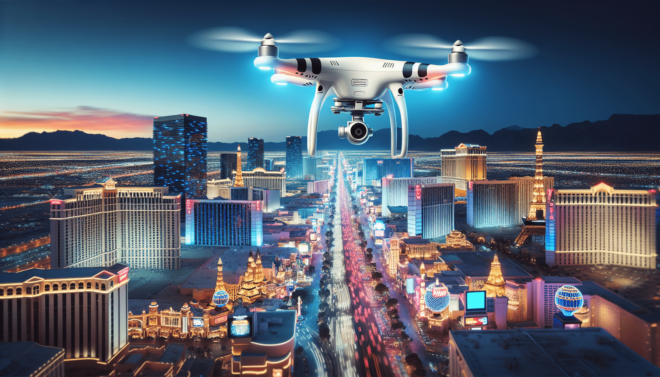Have you ever wondered what insurance considerations you should factor in when flying a drone in Las Vegas? Operating a drone in such a vibrant and bustling city comes with its own set of unique challenges and risks. As drone technology continues to evolve and expand, it’s critical to understand the insurance requirements to ensure you are legally compliant and protected against potential liabilities.
Understanding the Basics of Drone Insurance
Why Do You Need Drone Insurance?
Flying a drone involves much more than launching a device into the sky. Accidents can happen, and they can lead to significant financial liabilities. Drone insurance helps to cover the costs related to repairs, legal claims, and medical expenses if your drone causes injuries or damages.
Types of Drone Insurance
There are primarily two types of drone insurance you should be aware of:
- Liability Insurance: This covers third-party claims for bodily injuries or property damage caused by your drone.
- Hull Insurance: This focuses on protecting your drone itself in cases of damage or loss.
Are You Legally Required to Have Insurance?
While the Federal Aviation Administration (FAA) does not mandate drone insurance, many states and municipalities have their regulations. In Las Vegas, having drone insurance might not be legally required, but it is highly recommended, especially if you’re using your drone for commercial purposes.
Specific Insurance Considerations for Flying in Las Vegas
Air Traffic
Las Vegas is a bustling city with many unique air traffic concerns. The proximity to McCarran International Airport and frequent helicopter tours mean that drones must be operated with extreme caution.
Consideration:
- Ensure your insurance covers incidents related to air traffic control violations or collisions.
Public Events
Las Vegas is home to numerous public events and gatherings. Flying a drone over crowded areas increases the risk of accidents.
Consideration:
- Look for insurance that includes coverage for flying over large crowds and participating in public events.
| Risk Area | Consideration | Details |
|---|---|---|
| Air Traffic | Air Traffic Incidents | Ensure coverage for violations and collisions |
| Public Events | Large Gatherings | Coverage for flying over crowds |
Commercial vs. Recreational Drone Use
Recreational Use
If you are a hobbyist flying your drone for fun, you may find that standard liability insurance suffices. However, you should still consider getting hull insurance to protect your drone from accidental damage or theft.
Commercial Use
Commercial drone operations often come with higher stakes and more stringent requirements. Whether you’re doing aerial photography, surveying, or delivery services, you’ll need specialized insurance coverage.
Consideration:
- Commercial drone insurance often covers higher liability limits and can include additional areas such as data protection and invasion of privacy claims.
Regulatory Requirements
The FAA requires all commercial drone operators to have a Remote Pilot Certificate. In addition, obtaining commercial drone insurance will likely be necessary for certain contracts and permits.
| Use Type | Required Insurance | Additional Considerations |
|---|---|---|
| Recreational | Basic Liability | Hull insurance recommended |
| Commercial | High Liability Limits | Data protection, invasion of privacy |
Specialized Insurance Coverage
Personal Injury Coverage
Personal injury insurance covers you against claims that involve slander, libel, or invasion of privacy, which can become particularly important if you are capturing videos or photos in public spaces.
Unmanned Aircraft System (UAS) Insurance
This coverage can be more extensive, often coming as a package that covers both liability and physical damage to the drone.
Consideration:
- Make sure you understand the full scope of your policy to ensure it includes essential coverages specific to your operations.
Insurance Providers Specializing in Drone Coverage
Choosing the right insurance provider can make all the difference. Look for companies that specialize in drone coverage:
Companies to Consider
- Global Aerospace: Known for tailored policies to fit various needs.
- AIG: Offers extensive and reliable coverage options.
- SkyWatch.AI: Provides instant coverage options through a digital platform.
| Provider | Known For |
|---|---|
| Global Aerospace | Tailored policies |
| AIG | Extensive coverage |
| SkyWatch.AI | Instant digital coverage |
How to Choose the Right Policy
Assess Your Risks
Before selecting an insurance policy, assess the specific risks associated with your drone operations in Las Vegas. Are you flying over crowded areas? Do you frequently operate near airports?
Compare Quotes
Don’t just settle for the first quote you receive. Compare multiple providers to find the best coverage for your needs at a reasonable price.
Understand Exclusions
Read the fine print to understand what is not covered by your policy. Common exclusions might include damages due to illegal operations or flying in restricted areas.
Filing an Insurance Claim
Immediate Steps
In the unfortunate event of an incident, follow these steps:
- Secure the Scene: Make sure everyone is safe.
- Document the Incident: Take photographs and gather witness statements if possible.
- Contact Your Provider: Notify your insurance provider immediately and follow their instructions for filing a claim.
Documentation Required
Prepare necessary documentation such as:
- Proof of FAA registration
- Remote Pilot Certificate (if applicable)
- Detailed account of the incident
Final Thoughts
Understanding and securing the right drone insurance coverage is crucial for safe and compliant drone operations in Las Vegas. Whether you use your drone for recreational or commercial purposes, being fully insured protects you against unexpected mishaps and legal issues.
By knowing the specific risks and regulatory requirements associated with flying in Las Vegas, you can choose the right insurance coverage that offers the protection you need. Always assess your risks, compare providers, and understand policy exclusions to make an informed decision.
Stay safe and happy flying!

